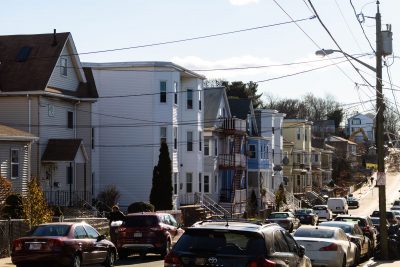
More than $26 million in funding will be allocated to advance affordable housing in seven Boston neighborhoods, Boston Mayor Martin Walsh announced Wednesday.
The funding will create and preserve 515 housing units across 10 developments in Brighton, Dorchester, East Boston, Mattapan, Mission Hill, the North End and Roxbury, according to a press release from the City’s Department of Neighborhood Development.
Nearly 300 units of housing will be reserved for households with low to middle incomes, and the majority of these units will be available for families whose incomes amount to 60 percent or less of the area’s median income, which is $65,000 or less for a family of four.
“As Boston continues to grow, we want to make sure everyone has a place to call home, no matter their income,” Walsh said in the release. “It’s important now more than ever that we use every tool in our toolbox to build more housing for working families in our City.”
The project is funded from three City government sources. More than $4 million will come from the Department of Neighborhood Development, about $3.6 million from the Neighborhood Housing Trust and the majority — about $18 million — from the Community Preservation Fund.
The Community Preservation Fund was created to further invest in affordable housing, historic preservation, public recreation and open space. It is sourced partly from a 1 percent property tax surcharge adopted from a ballot question by Boston voters in 2016.
One organization benefiting from this funding is Preservation of Affordable Housing. The Boston-based nonprofit developer will move forward with the second stage of redevelopment for the Whittier Street Apartments in Roxbury, as well as the construction of 42 units of housing for people over the age of 55 who earn at or below 80 percent of the area median income.
Maria Plati, the senior communications director at POAH, wrote in an email that the United States built 7.3 million fewer homes in total than it needed to between 2000 and 2015 to keep up with demand and population growth.
Since beginning to work in Boston in 2012, Plati wrote, POAH has preserved more than 500 affordable apartments for seniors in the South End, West End and Kenmore Square.
“Our first and most important role is to support our residents in remaining stably housed,” Plati wrote. “We do this through strong property management and by offering services and access to programs that help residents succeed in six areas: Housing, Community Engagement, Education, Health, Employment and Financial Stability.”
Anais Arias-Aragon, 23, of Jamaica Plain, said she had trouble believing that the City would choose to prioritize its poorer residents with new affordable housing projects.
“From what I’ve understood, usually it’s folks in the upper end of that spectrum that are getting that housing because they’re being prioritized because they’re ‘more reliable at paying rent,’” Arias-Aragon said. “And so I question who’s really going to get that housing. I’m skeptical.”
Arias-Aragon said it is important the City should address the needs of LGBTQ citizens of color who are experiencing homelessness.
“Usually, trans and LGBT people of color, these are the folks that need to be prioritized for this housing,” she said. “Those are the folks that really have been completely dismissed by their families oftentimes, so they don’t have any place to go. I think that should be the priority.”
Brighton resident Leena Khan, 23, said she was concerned about Boston youth who are affected by unstable, unaffordable housing.
“Boston is an extremely expensive city to live in, whether it’s families or students,” Khan said. “… I think that’s why the cost is so high. I don’t think the majority of people in Boston can afford to live in this city, so I think the budget is excellent.”
Joel Lau contributed to the reporting of this article.



















































































































superherohype forum aquaman • Feb 27, 2019 at 1:31 am
Keep on working, great job!